The Works of Samuel M. Zwemer (18 vols.)
Digital Logos Edition
Overview
Nicknamed the “Apostle to Islam,” for nearly 40 years Samuel M. Zwemer lived and worked in the Middle East, preaching the Gospel of Jesus and training hundreds of missionaries. Founder and editor of The Moslem World, Zwemer—familiar with the land, language, and people of Islam—provided a window into a growing religion and culture that few Westerners knew. This collection is the fruit of that labor, bringing together all of Zwemer’s major works about Islam at the turn of the twentieth century.
Consisting of essays, lectures, articles from The Moslem World, and the books that made him a respected authority in his field, Zwemer’s legacy as one of the finest Christian scholars of Islam is still recognized today.
In the Logos edition, all Scripture passages in The Works of Samuel M. Zwemer are tagged and appear on mouse-over. What’s more, Scripture references are linked to the wealth of language resources in your Logos library. If you own the English and Arabic Qur’an, you can follow along with Zwemer in his analysis of Islamic doctrine and his studies comparing Islam to Christianity. This makes these texts more powerful and easier to access than ever before for scholarly work or personal Bible study. With the advanced search features of Logos Bible Software, you can perform powerful searches by topic or Scripture reference—finding, for example, every mention of “atonement” or “apostasy.”

- Key works from the “Apostle to Islam,” Samuel M. Zwemer
- Detailed studies of Islam and Muhammad
- Ideal for comparative religion studies
- Biographies of Raymund Lull and Al-Ghazali included
- Title: The Works of Samuel M. Zwemer
- Author: Samuel M. Zwemer
- Volumes: 18
- Pages: 4,215
This title is included in the following collections
You can save when you purchase this product as part of a collection.
Logos 7 Baptist Portfolio Lega...
$4,749.99$4,749.99Logos 7 Collector's Edition Le...
$11,399.99$11,399.99Logos 6 Collector's Edition Le...
$11,399.99$11,399.99
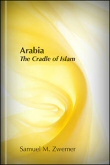
After spending 9 years in what is now Yemen and Saudi Arabia, Zwemer traces the spiritual as well as the physical geography of Arabia by showing how Islam grew out of the earlier Judaism, Sabeanism, and Christianity. Written from a missionary standpoint, Zwemer’s work paints a clear portrait of life in Arabia at the turn of the 20th century.
He writes full and graphically of the country, the people and their religion, and the missionary work.
—The Spirit of Missions
The comprehensive scope of the volume covers a wide range of interest, scientific and commercial, historical and literary, sociological, religious.
—Outlook
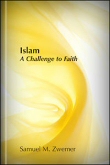
The purpose of this book is to present Islam as a challenge to the faith and enterprise of the Christian church. “But if we are to reach that world with the Gospel of Christ we must first know of it and know it.”
Chapters include:
- The Origin and Sources of Islam
- Mohammad, the Prophet of Islam
- The Spread of Islam
- The Faith of Islam
- The Practice of Islam
- The Ethics of Islam
- Division, Disintegration, and Reform
- The Present Condition of the Moslem World
- Missions to Moslems
- Methods and Results
- The Problem and the Peril
- A Challenge to Faith
Dr. Zwemer has rendered very exceptional service to the cause of Christian missions by the preparation of a book upon this important subject which is so well adapted to use in mission study circles, and throughout the Church. Authoritative information on the Mohammedan problem, in such a concise and available form, backed by thorough scholarship and evangelical discernment, is truly a great boon.
—James S. Dennis
It is a superbly effective presentation of a subject of tremendous present interest to the Christian world.
—Arthur J. Brown
Dr. Zwemer by his long experience in Arabia and exhaustive studies on the Moslem problem has earned the right to speak as one who knows.
Islam is a large subject. Whole libraries are given to it. It takes a master of the subject to bring into one compact volume an accurate account of the origin, the founder, the extension, the doctrines, the ethics, the decay, the spiritual needs of so great a movement as Mohammedanism, and—best of all—to do it without losing the unity and power of a great missionary purpose in the writing of the book.
—Charles R. Watson
This book by Dr. Zwemer, an experienced missionary to Mohammedans, is a thoroughly workmanlike presentation of its subject, and, as a study in the world-wide activities of Christianity and Mohammedanism in their relation to each other, it stands unrivalled.
—The London Quarterly Review
This is a powerful plea for missions to Mohammedans and it will take its place with the best or our abundant and admirable missionary literature. By heredity, by training, by long observation and experience in the home and stronghold of Islam, by intensity of conviction, by intelligence and strength of faith, the writer may, without exaggeration, be pronounced uniquely qualified for his great work.
—The Princeton Theological Review
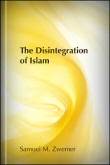
Dr. Zwemer traces the collapse of Islam as a political power in Europe, Asia, and Africa, as well as the inevitable effect of the impact of Western Civilization at the turn of the 20th century. Originally lectures delivered at Princeton Theological Seminary, the Theological Seminary of the Reformed Church in America, and at the Theological Seminary of the American Mission in Cairo, Zwemer later revised and expanded the lectures into book form.
Lectures included:
- The Dead Weight of Tradition
- The Revolt and Its Failure
- The Political Collapse
- The New Islam: Has It a Future!
- The Present-Day Attitude to Christ and Christianity
Delivered before three theological seminaries, and written by one occupying Dr. Zwemer’s position of leadership and authority, it holds a presumptive claim to interest, to reliable information, and to responsible judgment. To read these lectures is to feel that the claim is well established.
—The Moslem World
This careful work is almost indispensable for the serious student of missionary work among the followers of Islam today.
—The Survey
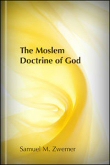
Zwemer investigates not only the Qur’an, but also the Hadith (the records of the authoritative sayings and doings of Muhammad), as well as Islamic orthodox traditions in this concise and focused study into the Muslim doctrine of God.
Brief and unpretentious though it is, it should be an authority on the subject which it discusses.
—The Princeton Theological Review
The study is painstaking and thoughtful. Deserving of close attention as a piece of earnest thinking and writing.
—The Spectator
This is a welcome contribution to the better understanding by the reading public of just what Muhammad did teach and what his followers said he taught.
—New York Observer
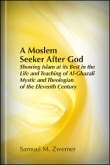
Al-Ghazali (1058–1111) is considered by many to be the most influential Muslim after the Islamic prophet Muhammad. In A Moslem Seeker After God, Zwemer provides a fascinating biography of Al-Ghazali’s life, teachings, and influence on Islamic philosophy and culture.
The whole book is human and thoroughly readable, certainly one of the best books from the hand of the author, and it helps to make real to us a truly great seeker after God and a Muslim brother.
—The Moslem World
Dr. Zwemer’s exposition of his theology, his description of his religious experience, his interpretation of his ethics and his tracing of the teaching of Jesus in the character and life of this ancient mystic reveal him as a very unusual personage, who, even in this remote day, may service as a bridge between Mohammedanism and Christianity.
—The Christian Advocate
Dr. Zwemer has brought together a mass of intensely interesting data concerning this unique personality and the reader will be delighted with the analysis of his influence which the author makes.
—Christian Intelligencer
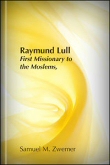
Raymund Lull: First Missionary to the Moslems is Zwemer’s classic biography of philosopher, logician, missionary, and Franciscan tertiary Raymond Lull.
A splendid illustration of the contagious vitality of Christian experience. The story is one of the most dramatic in the annals of missions.
—Chicago Record-Herald
May ten thousand times ten thousand buy and read, and thus be drawn to a life of deeper devotion to the life by which if a man lives, he cannot die.
—Union Seminary Magazine
It will strengthen your faith and quicken your zeal.
—Christian Companion
The book ought to go into the hands of every Christian in Christendom—especially of the younger—to help to rouse from apathy and to save from judgment.
—Homiletic Review
Told in Dr. Zwemer’s inimitable style, and with the scope and grasp supplied by its almost unequaled understanding of things Mohammedan, this little biography is sure to be of great value to the cause in behalf of which it was written.
—The Mission Field
There is no more heroic figure in the history of Christendom.
—Eugene Stock, Church Missionary Society
Raymond Lull was schoolman, mystic, monk; that is to say, he belonged to his century. But the spirit which dwelt in him is the undying spirit of all Christian centuries. ‘He who loves not,’ he said, ‘lives not: he who lives by the life cannot die.’
—The American Journal of Theology

A well-balanced study of superstition and spiritism in Islam, Zwemer shows how Islam sprang from pagan soil and, despite its vigorous monotheism, retained many of its old Arabian beliefs. Originally a series of lectures delivered at Hartford Seminary and at Princeton Theological Seminary, Zwemer revised the lectures for publication.
Lectures included:
- Islam and Animism
- Animism in the Creed and the Use of the Rosary
- Animistic Elements in Moslem Prayer
- Hair, Fingernails, and the Hand
- The ’Aqiqa Sacrifice
- The Familiar Spirit or Qarina
- Jinn
- Pagan Practice in Connection with the Pilgrimage
- Magic and Sorcery
- Amulets, Charms, and Knots
- Tree, Stone, and Serpent Worship
- The Zar: Exorcism of Demons
An epoch-making book and bound to make a stir in circles of religious thought.
—Christian Intelligencer
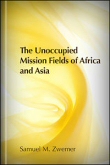
Zwemer surveys the state of missionary work in Africa and Asia after discussing the geographical, political, social, moral, and religious conditions in these countries—then sounds the call to spread the word and work of Christ. “If the unoccupied fields of the world are to be occupied for Jesus Christ and by Him, those who have surrendered their lives to His service and are willing to dare and endure must enter these fields.”
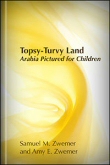
Inspired by Arabian Nights, Samuel Zwemer and his wife penned a book for young adults and children to teach them about the people and places of the Bible lands.
No one is too old and very few are too young to enjoy and profit by it.
—Presbyterian Journal
A book of pictures and stories for big children and small grown-up folk, for all who love Sinbad the Sailor and his strange country.
—Boston Globe
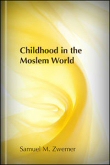
For 20 years, Samuel M. Zwemer served as a missionary in Arabia. In Childhood in the Moslem World, Zwemer vividly sets forth the environment and the physical, intellectual, and social conditions of children based off his numerous years of observation and work at the turn of the 20th century.
The claims of millions of children living and dying under the blighting influence of Islam are set forth with graphic fidelity. Both in text and illustrations, Dr. Zwemer’s new book covers much ground hitherto lying untouched in Muhammedan literature.
—Christian Work
It is anything but a book for children, it is about children, and is intended for the sober and Christian reading of those who may be stirred thereby to do something for their relief.
—Sunday School Times
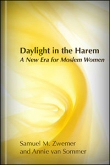
Each chapter in this volume about the plight of Muslim women was written by female missionaries stationed in various parts of the Middle East—with the exception of 3: the chapter on Turkestan is by a Muslim convert, and 2 chapters from Yemen and Central Sudan were written by medical missionaries. These first-hand accounts about the everyday lives of women in the Middle East take the reader “behind the veil” while also relating the challenges that missionaries faced at the turn of the 20th century.
From the hearts of heroic women, who know whereof they speak, come story after story of these hidden lives. The veiled women and girls of Islam pass before us so vividly that we feel that we can almost touch them, and the beautiful illustrations are eloquent with the same impression of a misery so deep and so hopeless that they must be saved.
—The Missionary Review of the World
No one can read this sad story of darkness and wrong without recognizing a duty toward the women of the East.
—The Outlook
Our Moslem Sisters is an appeal to the Christian Church on behalf of millions of women who lie under the heel of Islam, a condition more pitiless and difficult than savagery and farther removed from visions of holiness and sound of heavenly voices.
—Women’s Work
The cry of distress is also a cry of pain. The testimony given by missionary workers in that wonderful book, Our Moslem Sisters, is full of pathos and unveils conditions that are heartrending.
—Woman’s Missionary Friend
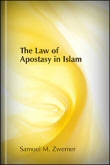
A collection of papers read at the Lucknow Conference on Missions to Moslems in 1911, each paper describes reform movements already underway in Turkey and Persia, the conditions surrounding Muslim women, and the best methods for future missionary work.
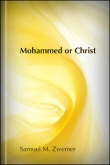
In The Law of Apostasy in Islam, Zwemer uses the Qur’an and other Arabic sources to challenge Islamic scholarship that champions severe punishment—even death—for those that convert to other religions.
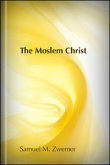
Mohammed or Christ brings together prolific author and missionary Samuel M. Zwemer’s articles that originally appeared in various magazines, including The Constructive Quarterly, The Missionary Review of the World, and The International Missionary Review.
Articles included:
- The Tale of Three Cities
- A United Christendom and Islam
- A Census of the Moslem World
- Islam in Russia
- Islam in South Africa
- Why Arabia?
- The Impending Struggle in Western Asia
- The Clock, the Calendar, and the Koran
- Translations of the Koran
- The Dying Forces of Islam
- Arabic Literature and Its Evangelization
- The Fullness of Time in the Moslem World
- The Stumbling-Block of the Cross
- The Present Attitude of Educated Moslems towards Jesus Christ and the Scriptures
- The Message and the Man
He writes full and graphically of the country, the people and their religion, and the missionary work.
—The Spirit of Missions

The Moslem Christ is an essay on the life, character, and teachings of Jesus Christ according to the Qur’an and the Orthodox traditions. Islam is the only of the great non-Christian religions which gives a place to Christ in its book, and yet it is also one of the non-Christian religions which denies His deity. This volume provides a gateway to understanding what Islam teaches about Christ and ends with a chapter on how to preach to Muslims about Christ with this knowledge.
Dr. Zwemer had good qualifications for undertaking this most useful task: a sense of its importance; a thorough knowledge of whatever had been written by any western author on the subject; and a knowledge of Arabic that gave him first-hand access to what Moslem books—the Koran, Hadith, and later legend-spinners—contain thereon.
—International Review of Missions
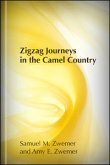
“The camels are waiting and the caravan is ready to start.” A follow up to Topsy-Turvy Land: Arabia Pictured for Children, Zigzag Journeys in the Camel Country: Arabia in Picture and Story is a fun storybook that teaches children about the people and places of Arabia and the heroic missionaries that travel through there.
The authors give the history of the first zigzag caravan routes that were made through the Arabian Desert, tell of the people who traveled them, and what they are like. Children will love Zigzag Journey’s.
—Continent
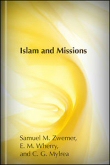
Islam and Missions contains the papers read at the Second Missionary Conference on behalf of the Mohammedan World at Lucknow in 1911.
Papers included:
- An Introductory Survey
- Pan-Islamism in Turkey
- Pan-Islamism in Africa
- The Dervish Orders in Africa
- The Moslem Advance in Africa
- Pan-Islamism in Malaysia
- Political Changes in Turkey
- Political Changes in Arabia
- Political Changes in Persia
- The Situation in India
- The Old and the New Regime in Turkey
- Conditions in Central Asia
- Islam under Pagan Rule
- Islam under Christian Rule
- Moslem Advance in India
- Moslem Advance in Malaysia
- Islam in China
- Islam in Russia
- Reform Movements in India
- Reform Movements in the Near East
Reflecting, as it does, a varied point of view, combining the matured convictions of men whose territory covers thousands of miles in the aggregate, we can say in all seriousness that it is unquestionably the most important contribution that has been made to the literature of the subject in many years.
—New York Times
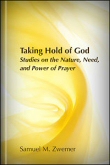
In Taking Hold of God, Zwemer lays out the case for the nature, need, and power of prayer.
Chapters include:
- The Antiquity and Universality of Prayer
- The Nature of Prayer
- Place and Posture in Prayer
- The Time Element in Prayer
- The Power of Prayer
- Hindrances to Prayer
- Non-Christian Prayer and Missions
- Prayer and Missions
- Some Old Testament Prayers
- The Prayers of Paul
- The Lord’s Prayer
- the Prayers of Our Lord
- A Devotional Service of Meditation
Samuel Marinus Zwemer (1867–1952) was born in Vriesland, Michigan and educated at Hope College, New Brunswick Theological Seminary, Muskingham College, and Rutgers College. Zwemer served as a missionary in the Middle East from 1891–1929 where he earned his nickname “The Apostle to Islam.” In 1929, he was appointed professor of missions and professor of the history of religion at Princeton Theological Seminary. He retired from Princeton College Seminary at the age of 70.
Zwemer was the founder and edited The Moslem World for 35 years and the author of dozens of books, articles, essays, and periodicals—mostly revolving around missionary work and Islam.
Reviews
4 ratings
Steven Turner
2/7/2024

Debra W Bouey
2/25/2016

David Leslie Bond
11/20/2013

Larry Proffitt (I
11/13/2013